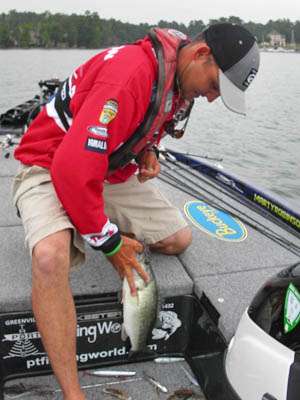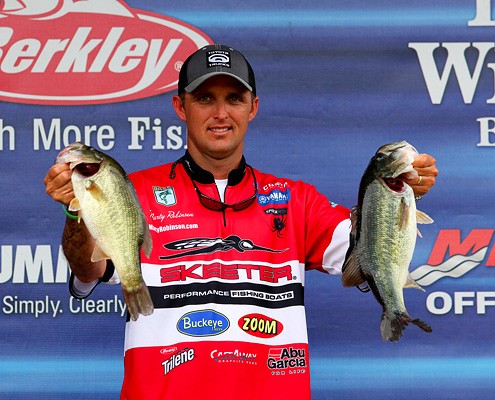
COLUMBIA, S.C. — “You hear that?”
Marty Robinson’s question takes surprising notice of something other than bass fishing. Perched on the bow of his boat, he tears his eyes from the water to glance back at his passenger.
What he’s drawing attention to sounds almost like radio static or a waterfall just over the next hill. You have to not talk to detect the thrum coming from the wooded shoreline.
“Cicadas,” he declares. “See, there’s a dead one.” He points to a belly-up bug bobbing on the water. It has safety-orange forelegs.
Robinson doesn’t examine the bug. His full attention is already back on the water. The 10-second exchange had been the only time he’d spoken of anything but bass fishing since his first cast at 6:36 a.m.
It’s Day One of the May 12-15 Evan Williams Bourbon Carolina Clash on South Carolina’s Lake Murray. Robinson lives in Lyman, S.C., 90 miles away. So although he’s not a true local, he is competing in his home state on a lake he knows very well, one he’s fished for years and competed on many times.
He wants to win, of course. Short of that goal, he wants a strong finish to move up enough in the Toyota Tundra Bassmaster Angler of the Year points race to claim his first Classic entry. He earned a Bassmaster Elite Series entry in 2007, but in four seasons, the Classic has always been just out of reach.
So far. Maybe not now.
Going into the Carolina Clash, he was in 46th place in points. The cutline for Classic entry is 28th place. However, this season’s multiple double-qualifiers are likely to push the cutline to the mid-30s range.
Because of his Murray history, this tournament is his best chance of the 2011 season to pile up some points.
At dawn on this first day of the Carolina Clash, the sky was covered with lumpy storm clouds. Wind ruffled the surface of Murray’s predominantly clear water. These two factors help Robinson. He is hitting flats on which, during practice days, he’s seen bass attracted by blueback herring.
By 9 a.m., he has in his livewell four decent bass, average weight of about 2 1/2 pounds, each a product of scores of casts. But by midmorning, the bass have turned superfinicky. The fifth bass for a limit eludes him. The fish could be too pressured, or too stuffed from breakfast. Too something, he doesn’t know what.
Robinson started the day with a transparent Zara Spook topwater. He quickly went to a pearl Zoom Fluke, both single- and double-rigged . But by midmorning he had used every rod on the deck. Besides the topwater and fluke, his main offerings have been a Buckeye Mop Jig, a Zoom Trick Worm on a Buckeye Spot Remover jighead, and a big silver Spook.
He has swung and missed only twice. Bites are rare. Since his early keepers, he’s boated only dinks, and not many of them.
By noontime, he’s struggling even more, thanks to little or no wind. Even the clouds are gone.
He’s even tried a Carolina rig, but doesn’t have much faith in it, and puts it down. He keeps casting, mainly the fluke and the worm, and moves often.
Finally he gets bit, the rod a promising bow.
“Don’t be a striper, don’t be a striper,” he prays out loud.
It is a striper, small by striper standards, but big enough to have felt like a good-size largemouth.
“There were 20 to 25 five 4-pound bass here yesterday,” he comments. “You couldn’t catch them, but you could see them.”
He goes to the docks, most any angler’s last resort in this tournament. He gets one. It measures about 1/2 inch too short of the 12-inch minimum size limit.
“You don’t want to be weighing ones that small anyway,” he says philosophically.

This is classic Robinson. If he feels discouraged, he does not let it show. And he is not the kind of guy to go crazy over things that go wrong
One telling example: Early in the day he hooked into two bass on a double-fluke rig. They both stayed on long enough for him to hope he’d get a two-for-one. But the tug-of-war between two fish ended with the largest winning its freedom before he could get them both to the boat. Robinson reeled in the second and, probably, smaller fish. He didn’t say much about the loss of the bonus, but jumped right back in to try for it again.
Another example: He is running to a point. He swings around an island, and sees another competitor coming from the opposite side of the island. Both boats pull up to the point at exactly the same time. The other angler shouts his claim to the spot: “I believe I beat you by three minutes.”
“No, we arrived at the same time,” Robinson states the obvious, “but you take it.”
He turns his boat around, heads out. He didn’t waste his breath arguing. He simply shakes his head and comments to his passenger that he’ll swing back in a few minutes, after the other angler has left the spot.
He wastes no time. Twice he sipped from a bottle of Gatorade. Once he took two bites of a Nutty Bar, but only when he was refilling the livewell. There are no breaks, no lunchtime, on this job.
“Not until there’s five fish in the boat,” he says.
Robinson has been periodically flipping open his livewell to be sure his four fish are still lively. In one late morning check, he sees a white belly, and that another is hurting. He says nothing, and grabs a bottle of conditioner from a nearby hatch.
“That usually helps them,” he says as he crumbles the crystals into the water. He checks his livewell pump switch. It’s off, and he is perplexed. “When did I turn that off?” he muses to himself. Culling a dead bass is not legal, and the penalty is 8 ounces. His Day One weight is in trouble.
He checks the livewell again about 10 minutes later. Three bass are fine; the fourth is gone for sure. He sighs and simply goes back to the bow and picks up his rod again.
Finally, the fifth keeper hits about 1 p.m. It’s a squeaker. That he must do better to make up for the 8 ounces he’ll lose goes unsaid.
As the day wears on, he periodically breaks out into song from the deck. Robinson says he can’t help but sing — despite the lost weight, despite the scarcity of bites.
Sometimes, he says, he sings with Casey Ashley. The two, along with Jonathon VanDam, are sharing a rental condo while on the road for the Lake Murray competition. But his wife, Iris, is the one with the vocal talent, Robinson says.
His phone rings. He ignores it. It’s against competition rules to talk on the phone during competition.
“Probably someone from work,” he says.
Isn’t this work?
“Is right now,” he concedes.
But he meant his plumbing business. When he’s not competing, he installs plumbing in new commercial and residential buildings. A man with a family — he and Iris have two kids — needs a way to be certain the bills will be paid, he says, and he likes the work.
“I’ve never been tempted yet to quit one or the other,” said Robinson, whose employee runs the business when he’s on the road. “I’ve always said that if I can pay the bills and not take away from my family, I’ll fish. Hopefully more sponsors will come my way to help me out a little bit.”
That day, Robinson never was able to upgrade his weight. He got credit for 11-14 on Day One after the 8-ounce penalty was applied. He was in 40th place; 8 ounces that day would have put him in 34th place.
The next day, he did better: 14-7 to make the top-50 cut at No. 11. On Day Three, his 11-8 wasn’t enough for a Top 12; he missed the all-important final-day cut by 10 ounces. His tournament was over.
“Whew,” he said when he later did the math. “If I had missed by 8 ounces, I would have felt bad. But 10 ounces makes it seem better.” He is as disappointed as anyone would be, but he still smiles.
“Anytime something bad happens, you try not to dwell on it. Anything bad’s going to get you down a little bit. It’s hard,” he said. “Maybe having two boys has taught me some patience, but I’ve always been easy going. I try to stay upbeat, I hate to see people with a negative attitude.”
Good reason to feel positive: His Lake Murray finish was 14th place, a strong contributor to his Classic quest. He moved up to 32nd place in points. If the season ended now, he’d be in the Classic thanks to the seven double-qualifiers ahead of him in the standings.
Last season, Robinson finished 43rd in the points standings, six places out of the Classic.
“This year, I’ve been trying to step it up a little bit,” he said. “Hopefully I can do well in the last two tournaments, and I can slip in.”
